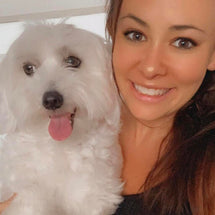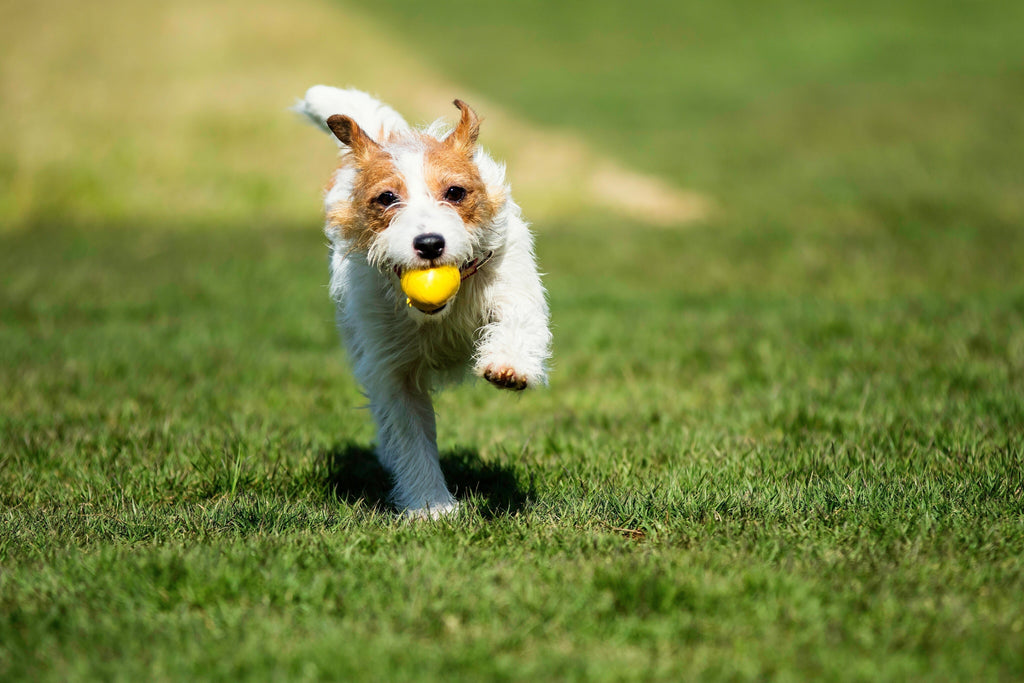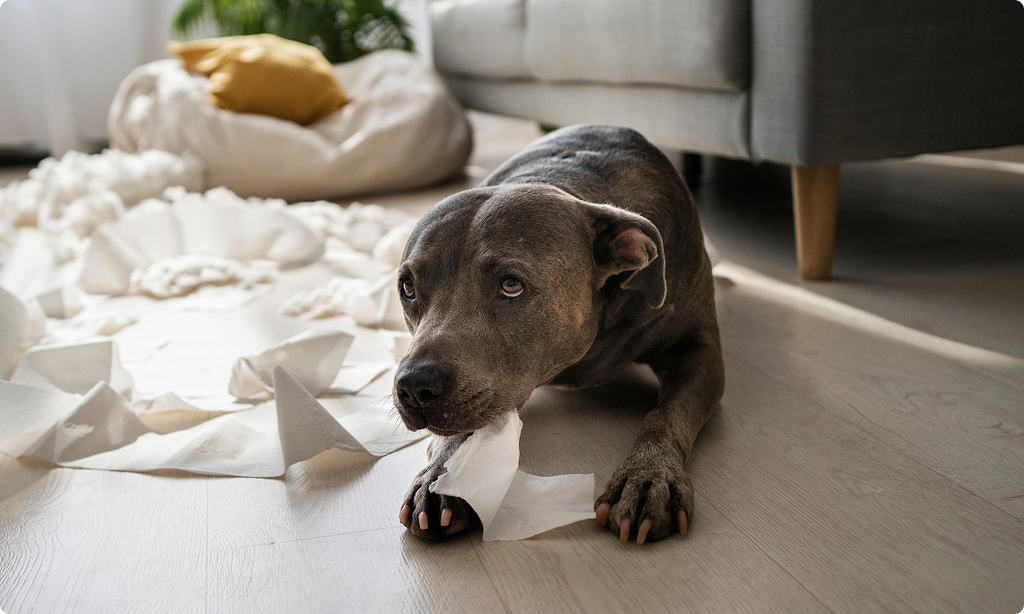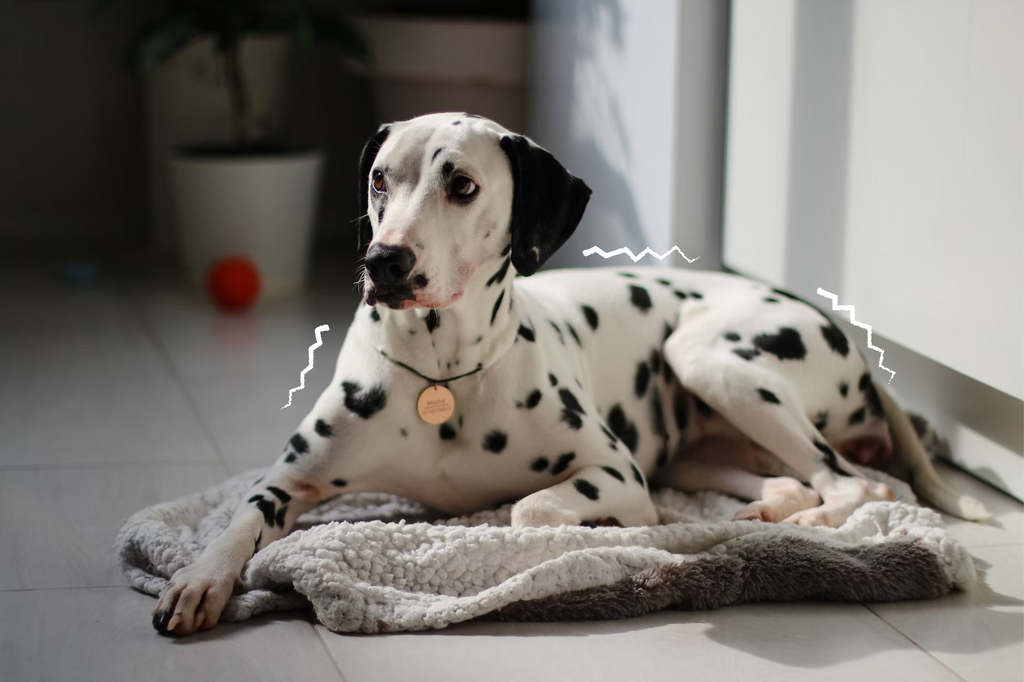Why Is My Dog So Gassy?

Ah, the unmistakable sound (and smell) of a gassy dog. Whether you refer to it as flatulence, farts, wind or toots, it's a moment every pet parent knows all too well. While it might be the butt of many jokes, a gassy dog isn't just a punchline, it's a sign that something's bubbling below the surface (quite literally!)
Is It Normal for Dogs to Have Gas?
Yes, it is normal for dogs to have gas, just like it is for humans. Gas is a natural part of the digestive process, and occasional flatulence is nothing to worry about. However, if your dog has excessive or very smelly gas, especially if it's accompanied by other symptoms like vomiting, diarrhoea, or changes in appetite, then it could indicate an underlying issue that might require attention.
Why Are Dogs Gassy?
To keep it simple, its usually because of a poor diet, or ingredients that don't sit well with your dog's tummy.
Dogs get gassy for the same reason we do: the build-up of gas in the gastrointestinal (GI) tract. This gas is usually the result of food fermenting in the stomach or intestines, producing that oh-so-lovely aroma. But there are a few key reasons why your pup might be particularly prone to letting one rip:
-
Diet: Just like with humans, certain foods can cause your dog’s digestive system to work overtime, leading to more gas. Foods that are too high in fibre, fat, or difficult-to-digest ingredients like beans, broccoli, or dairy can be prime culprits. To avoid this, try feeding your dog easily digestible dry dog food or BARF dog patties that are free from problematic ingredients like beans, broccoli, or dairy.
-
Eating Too Fast: If your dog gulps down their food like it's a race, they’re also swallowing a lot of air. This excess air has to escape somehow, and, well, we all know how that ends!
-
Food Sensitivities or Allergies: Just like us, dogs can have food sensitivities or allergies that cause digestive upset, including gas. Common offenders include grains, dairy, and certain meats.
-
Medical Conditions: Sometimes, excessive gas can be a sign of an underlying medical issue, like inflammatory bowel disease (IBD), pancreatitis, or even parasites. If your dog’s gas is frequent or accompanied by other symptoms like vomiting, diarrhoea, or weight loss, it’s time to see the vet.
-
Poor Quality Dog Food: Dog food filled with low-quality ingredients, fillers, and artificial additives can lead to an upset tummy and more gas. Always opt for high-quality, nutritionally balanced food.

How to Avoid Gassiness in Your Dog
While it’s impossible to avoid every toot, there are plenty of ways you can reduce the frequency (and intensity!) of your dog’s gas.
- Switch to a High-Quality Dog Food: Choose a dog food that’s made with easily digestible ingredients and is free from artificial additives. At Petzyo, we pride ourselves on using wholesome, natural ingredients that are gentle on your pup’s tummy. Our Salmon and Oceanfish Kibble, for instance, is packed with omega-3s, which not only supports healthy skin and coat but is also easier to digest.
- Feed Smaller, More Frequent Meals: Instead of giving your dog one or two large meals a day, try feeding them smaller portions more frequently. This can help reduce the amount of gas their digestive system produces.
- Slow Down Mealtime: If your dog eats like there’s no tomorrow, try using a slow feeder bowl or spreading their kibble out on a flat surface to encourage them to eat more slowly.
- Avoid Table Scraps: Human food is often too rich for dogs and can upset their stomachs. Stick to dog-safe treats and avoid giving them scraps from your plate.
- Introduce Probiotics: Probiotics can help balance the bacteria in your dog’s gut, leading to better digestion and less gas. You can find dog-specific probiotic supplements, or look for foods that are naturally rich in probiotics, like plain, unsweetened yogurt (in moderation).
- Exercise: Regular exercise helps keep your dog’s digestive system moving smoothly, which can help reduce gas build-up. Plus, a tired dog is a happy dog!
-
Monitor Their Health: Keep an eye on your dog’s overall health. If you notice any changes in their digestion, appetite, or energy levels, it might be time for a vet visit.
Do Legumes in a Dog's Diet Cause Excessive Flatulence?
Legumes like chickpeas, peas, and lentils are common in dog foods due to their protein and fibre content. However, they can impact your dog’s digestion differently.
Chickpeas are nutrient-rich but can be tough on your dog’s stomach. They contain higher levels of oligosaccharides, complex carbohydrates that are hard for dogs to digest. When these carbs ferment in the gut, they can cause gas.
Peas and lentils, on the other hand, are easier on the digestive system. They have lower oligosaccharide levels, making them less likely to produce gas. Both peas and lentils provide essential nutrients and support better digestion, making them a gentler choice for dogs prone to flatulence.
Are Older Dogs More Prone to Flatulence?
Unfortunately, yes. As dogs age, their digestive systems can slow down, leading to more difficulty breaking down food. This can result in increased gas production. Older dogs may also have less efficient gut bacteria, contributing to digestive issues and flatulence.

Are Some Breeds More Likely to be Gassy Than Others?
Some breeds are naturally more gassy due to their anatomy or typical dietary habits:
- Bulldogs: Their brachycephalic (short-nosed) structure causes them to swallow more air when eating, leading to gas.
- Boxers: Similar to bulldogs, their short noses contribute to air swallowing, and they can be prone to digestive issues that cause gas.
- Pugs: Their brachycephalic structure and tendency to gulp food can make them prone to gas.
- German Shepherds: They may have sensitive stomachs or be prone to digestive disorders that cause increased flatulence.
-
Labradors and Golden Retrievers: Known for their voracious appetites, they often eat too quickly, swallowing air that leads to gas.

When to Worry About Your Dog’s Gas
While most of the time, gas is just a natural (if smelly) part of life, there are times when it can indicate a more serious issue. If your dog’s gas is accompanied by:
- Vomiting or diarrhoea
- Weight loss
- Lethargy
- Changes in appetite
- Bloody stools
It’s important to consult your vet. These could be signs of a more serious gastrointestinal issue that needs medical attention.
A Final Toot on Dog Gas
While you might never be able to fully eliminate your dog’s gas, understanding the causes and making a few simple changes can make a big difference. With a high-quality diet, a bit of mealtime mindfulness, and some healthy habits, you can help your dog (and your nose) breathe easier.
So next time your dog lets one slip, remember—they’re just trying to tell you something. Listen to their tummy, make some tweaks, and enjoy a less fragrant home!
Myths Debunked!
Myth: All Dog Gas is Normal
While it's common for dogs to have occasional gas, persistent or very foul-smelling gas can indicate a dietary issue or health problem that should be addressed.
Myth: Only Low-Quality Food Causes Gas
Even high-quality dog foods can cause gas if they contain ingredients that don't agree with your dog's digestive system, such as certain grains, dairy, or some legumes.
Myth: Changing Diets Frequently Will Reduce Gas
Frequently switching your dog’s food can actually cause more digestive upset and increase gas. It’s better to gradually transition to a new diet to allow your dog’s digestive system to adjust.
Myth: Dog Gas is Just an Annoyance
While dog gas can be unpleasant, if it’s chronic or accompanied by other symptoms, it could be a sign of a more serious issue that needs attention.
Myth: Dogs Don’t Get Gas from Eating Too Quickly
Dogs that eat too fast do swallow air, which can lead to gas. Slowing down their eating can help reduce the amount of gas they produce.






